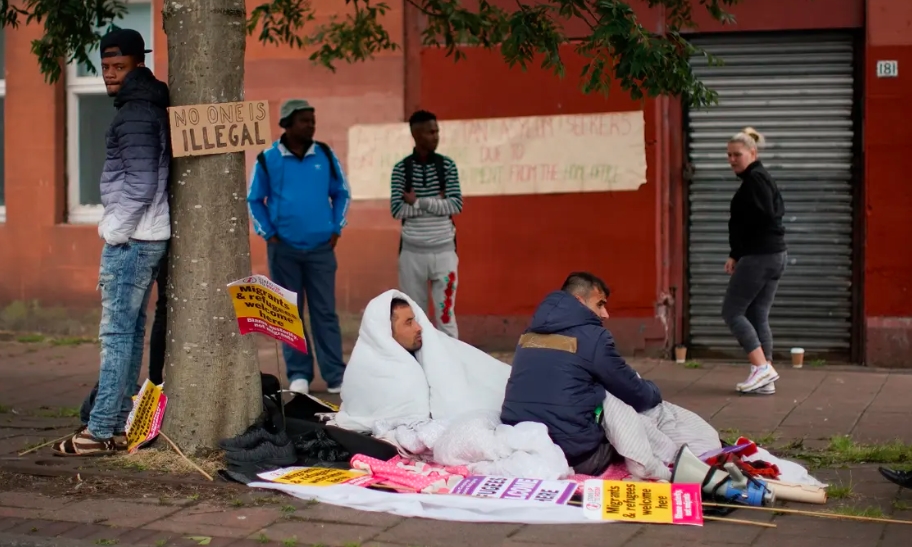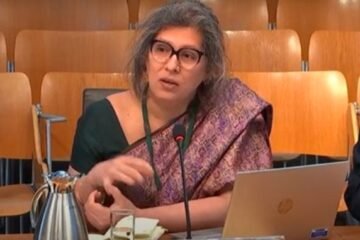The plight of refugees in Glasgow
Glasgow is home to thousands of refugees who have fled from war, persecution, and violence in their countries of origin. Many of them have been waiting for years to have their asylum claims processed by the Home Office, living in uncertainty and fear. Some of them have experienced trauma, abuse, and exploitation in the UK, while others struggle to access basic services and support.
One of them is Fatima, a 32-year-old woman from Syria, who lives in a hotel in Glasgow with her two children. She arrived in the UK in 2021, after escaping from the brutal regime of Bashar al-Assad and the Islamic State. She applied for asylum, hoping to find safety and stability in her new home. However, she has been stuck in limbo ever since, without any decision on her case or any indication of when it will be resolved.
“I don’t feel safe in my home,” she says. “The hotel is dirty, noisy, and overcrowded. There are drug dealers and addicts in the corridors. The staff are rude and disrespectful. The food is horrible and unhealthy. We have no privacy, no space, no dignity. We are treated like animals.”
Fatima says she suffers from depression, anxiety, and insomnia. She worries about her children’s health and education. She has no access to legal advice, medical care, or social work. She has no money, no rights, no future.

“I came here to seek protection, but I feel like I’m in prison,” she says. “I don’t know what will happen to me and my children. Will we be deported? Will we be granted asylum? Will we ever have a normal life? I have no answers, no hope, no peace.”
The causes of the asylum backlog
Fatima is not alone in her predicament. According to the British Red Cross, there are more than 50,000 people in the UK who are at risk of homelessness by the end of the year, due to the backlog of asylum applications. The charity says that the backlog has been caused by a combination of factors, including:
- The Covid-19 pandemic, which disrupted the operations of the Home Office and the courts, and increased the vulnerability of asylum seekers.
- The lack of adequate and humane accommodation for asylum seekers, especially during the lockdowns, when many of them were moved to hotels or barracks without proper facilities or safeguards.
- The complexity and inefficiency of the asylum system, which often delays or denies the recognition of genuine refugees, and leaves them in a state of limbo for years.
- The lack of political will and public support to address the issue of asylum, which is often distorted by misinformation, prejudice, and hostility.
The British Red Cross says that the asylum backlog has serious consequences for the human rights, health, and wellbeing of refugees, as well as for the social cohesion and economic development of the UK. It calls for urgent action from the government and the society to tackle the problem, and to provide refugees with dignity, justice, and opportunity.
The solutions for the asylum backlog
The British Red Cross proposes a number of recommendations to improve the situation of refugees in the UK, and to reduce the asylum backlog. These include:
- Increasing the capacity and efficiency of the Home Office and the courts to process asylum applications, and to ensure fair and timely decisions.
- Providing adequate and humane accommodation for asylum seekers, with access to essential services and support, and respect for their privacy and dignity.
- Improving the quality and availability of legal advice, medical care, and social work for asylum seekers, and ensuring that they are informed of their rights and options.
- Enhancing the integration and participation of refugees in the UK, by facilitating their access to education, employment, and community activities, and by promoting their contribution and potential.
- Engaging the public and the media in a constructive and compassionate dialogue about asylum, and challenging the myths and stereotypes that fuel hostility and discrimination.
The British Red Cross says that these recommendations are not only feasible, but also beneficial for the UK, as they would help to create a more humane, inclusive, and prosperous society.
“We believe that every refugee matters, and that every refugee deserves a chance to rebuild their lives in safety and dignity,” the charity says. “We urge the government and the society to join us in this vision, and to show the best of humankind to those who have experienced the worst of it.”


















